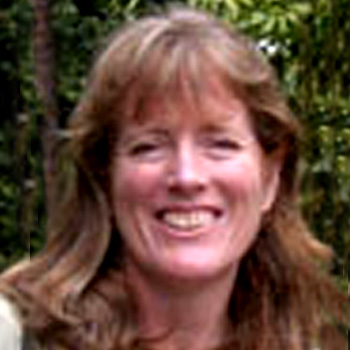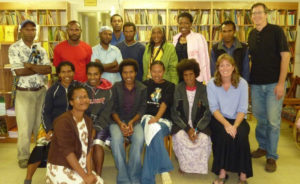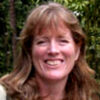Back to series



A Fellow's Journey from Washington to Wycliffe
Click here to open a Print - Friendly PDF
"If you could do any job, what would it be?” asked Art Lindsley as part of my vocational analysis as a C.S. Lewis Institute Fellow in March, 2006.
“Well, the job I seem most suited for is chief operating officer. The organization that I have always loved is Wycliffe Bible Translators. The Bible has greatly impacted my life, and I can’t imagine being a Christian without one in my native language. So my dream job would be chief operating officer of Wycliffe.”
Trying another method to draw out my preferences, Art asked, “If you were given a million dollars and could do anything, what would you do?”
“Well, I like to work,” I replied. “I have no driving personal dreams. So I would seek to be COO of Wycliffe. But then I wouldn’t have to raise my financial support!” I may have exasperated Art a bit in the moment. But six years later, I can foresee that my “dream” could possibly become a reality—without my intentionally seeking it out.
Eager for Cross-Cultural Ministry
I headed into missions work right after college. Feeling drawn to the most challenging unreached people, Muslims, I studied Arabic, took a Modern Islamic Thought class, and flew off to London to do outreach. But after nine months overseas full of frustration over ineffective strategies, I came home with my hopes dashed, the way forward unclear.
Having college friends in the Washington, D.C., area, I moved there and found work with an international organization. Throughout my twenties, I envisioned myself returning to Christian ministry. A “short-termer” mentality hooked in: this job will just tie me over until . . . But into my thirties, God didn’t seem to be leading me anywhere, so I settled in.
In 1997 I said yes when a friend asked me to help organize an event for “emerging urban leaders,” folks in their twenties working in inner-city ministries. This introduced me to some of the challenging needs of my own locale. For a year I attended and worked with a small dysfunctional but sweet church in NE Washington that ministered to its surrounding community.
Realizing the congregation wasn’t good for me long-term, I moved on to a church on Capitol Hill that had a vision to reach out to the neighborhood to their east and south. Going all out, I bought a house in a poor section on eastern Capitol Hill and began to lead a Bible study for neighborhood high school girls. During that time I also taught a class on white privilege and race.
Professionally Languishing?
 Professionally, I tried for years to get a job with an urban ministry. I saw the potential benefits of my administrative and management skills combined with my cross-cultural experience. But I got nowhere, not even one job interview. I wondered if God was listening, if He cared. I wanted His direction. I wanted to “do good to those in need.”
Professionally, I tried for years to get a job with an urban ministry. I saw the potential benefits of my administrative and management skills combined with my cross-cultural experience. But I got nowhere, not even one job interview. I wondered if God was listening, if He cared. I wanted His direction. I wanted to “do good to those in need.”
Instead I had little vision for my work, carrying out responsibilities I didn’t care much about. My challenges were mostly outside of work, where I kept taking cross cultural risks.
I thought about what people saw on my résumé: administrative and finance experience. I had been repeatedly promoted in a large nonprofit because I had well-suited business skills. God seemed to say, “Go with that.” I was increasingly disappointed, even angry.
“So this is it? Does this say that I have no people skills, no ministry gifting, so I just do boring financial work that doesn’t really help people? Is this all I’m going to end up doing in life?”
As I enrolled in accounting classes, more doors opened for me professionally. I became chief financial officer of a nonprofit medical clinic even though I had never worked in an accounting department. My attitude also shifted profoundly. I saw that helping nonprofits run effectively, with financial soundness and integrity, can free them up to pursue their missions.
Most nonprofits are desperate for good financial people. I was glad to be able to bring that gift to the table. I realized that if my job responsibilities were broader and more challenging, finance work wasn’t so boring after all.
I applied to the CSLI Fellows Program in April 2005, thinking I was going to be in Washington, D.C., for many years. But then in 2006, I met a couple at church who were Bible translators in Papua New Guinea. I told them how I’d supported Wycliffe for years and always thought about working for them.
But now that I was into finance, I didn’t know what I could do or how it would ever work. They quickly explained the need for finance staff in Papua New Guinea and eagerly took my contact information. They emailed me six months later, telling me their CFO had had a stroke. “Would you consider coming here?”
Open Doors
After telling God that I really didn’t want to have to raise my financial support, He reminded me of the many ways He had provided for me over the years. I couldn’t contest that. “Okay. I’ll begin to move forward with this and see if you open doors.” Within one year, I was in Papua New Guinea.

Since then, life has been an incredible experience. I thought I was coming to work in a nonprofit but discovered that Wycliffe runs a center of operations in the Highlands of Papua New Guinea. Amazingly, I was given oversight of the finances of a town of ministry workers, complete with five planes and two helicopters, a school, grocery store, clinic, hardware store, print shop, and utility services (power, water, roads, and trash removal).
Because of the weak infrastructure of the country and the remoteness of most of the eight hundred language groups, Wycliffe found this the best way to support Bible translation here. I’ve also learned that “stone age” is actually a description of a way of life and not always a pejorative term.
Although I originally could fathom committing for only two years, I’m now going on four and a half. I am set to go on furlough in August and return to Papua New Guinea in January, 2013 for two more years. What keeps me here? It has been the most challenging professional experience of my life.
I could never have gotten such a job in the States, with a paid salary and serious competition. I was definitely underqualified. But I had enough of the right experience and skills to make it work.
I’ve been able to see real change as a result of my efforts and much growth in my management and leadership skills. And I have enjoyed working with others motivated by the same cause and learning more about the Bible translation movement worldwide.
Lessons Learned?
 People ask me what I’ve learned spiritually since arriving in Papua New Guinea. I have a hard time answering. It’s not facts about God or me. It’s more of a strengthening inside, a deepening trust and commitment to God.
People ask me what I’ve learned spiritually since arriving in Papua New Guinea. I have a hard time answering. It’s not facts about God or me. It’s more of a strengthening inside, a deepening trust and commitment to God.
I’ve had so many new opportunities and challenges. For four months it seemed I was bringing up hard truths to people every other day. I learned that I don’t have to know exactly what to say or do. I just need to move forward, trusting God to walk with me.
God was listening to me when I was wandering in the desert trying to get into an inner-city ministry. I see God’s hand, holding me back, as a kind hand. He knew that I am much happier in large organizations. He knew my heart for Bible translation. I am very grateful to Him for leading me here. He knew that my skills were needed here, and I could have a big impact.
Although my social world has definitely shrunk living in a small town in one of the remotest places on earth, I have come alive professionally.
Before going to Papua New Guinea, I spent two years in the CSLI Fellows Program going deeper with Christ and getting to know a great group of women. They supported me through the application and leaving process.
They have prayed, given toward my financial support, emailed, and regularly sent care packages. Behind me, as cheerleaders, I feel I have a peer group of professional women who are sincerely seeking God. That makes a big difference.
I have seen God be faithful to me as I’ve taken many risks. I still get scared at times. I can be an Israelite, doubting God after all the evidence of His care. I’ve learned more in the past five years about how much I need people to support me in order to survive. Sometimes I’d rather just be independent.
But I know that would be a much less fulfilling and God-honoring life. So I keep walking in faith, eager to see what surprise is around the next corner.

Jeanne Thum
CSLI Fellow Jeanne Thum has been serving as Chief Financial Officer in Papua New Guinea with Wycliffe Bible Translators since 2007. Before that, she spent twenty years in the Washington, D.C. area serving in a variety of finance and administrative roles in international organizations. She was a C.S. Lewis Fellow from 2005-2007 and her group continues to meet regularly.
 COPYRIGHT: This publication is published by C.S. Lewis Institute; 8001 Braddock Road, Suite 301; Springfield, VA 22151. Portions of the publication may be reproduced for noncommercial, local church or ministry use without prior permission. Electronic copies of the PDF files may be duplicated and transmitted via e-mail for personal and church use. Articles may not be modified without prior written permission of the Institute. For questions, contact the Institute: 703.914.5602 or email us.
COPYRIGHT: This publication is published by C.S. Lewis Institute; 8001 Braddock Road, Suite 301; Springfield, VA 22151. Portions of the publication may be reproduced for noncommercial, local church or ministry use without prior permission. Electronic copies of the PDF files may be duplicated and transmitted via e-mail for personal and church use. Articles may not be modified without prior written permission of the Institute. For questions, contact the Institute: 703.914.5602 or email us.
-
Recent Podcasts
Ralph Waldo Emerson’s Philosophy and Influence
by David George Moore on July 26, 2024Ralph Waldo Emerson was a gifted nineteenth century...Read More
-
The Side B Stories – Nate Sala’s Story
by Jana Harmon, Nate Sala on July 19, 2024
-
Terrorism Through the Eyes of Faith
by Dennis Hollinger on July 12, 2024
-
Recent Publications
Hasn’t Science Proven That Belief in God Is an Outdated Superstition?
by Sharon Dirckx on July 1, 2024Many assume that scientific practice and belief in...Read More
-
Has the Bible Been Corrupted as Some Muslims Claim?
by Andy Bannister on June 1, 2024
-
Seeing Jesus Through the Eyes of Women
by Rebecca McLaughlin on May 15, 2024
0
All Booked
0.00
All Booked
0.00
All Booked
22194
C.S. Lewis’s The Abolition of Man Live Online Small Group 8:00 PM ET
https://www.cslewisinstitute.org/?event=c-s-lewiss-the-abolition-of-man-study-course&event_date=2024-10-02®=1
https://www.paypal.com/cgi-bin/webscr
2024-10-02

Next coming event
Days
Hours
Minutes
Seconds
C.S. Lewis’s The Abolition of Man Live Online Small Group 8:00 PM ET
On October 2, 2024 at 8:00 pmSpeakers

Jeanne Thum
CSLI Fellow
Team Members

Jeanne Thum
CSLI FellowJeanne Thum has been serving as Chief Financial Officer in Papua New Guinea with Wycliffe Bible Translators since 2007. Before that, she spent twenty years in the Washington, D.C. area serving in a variety of finance and administrative roles in international organizations. She was a C.S. Lewis Fellow from 2005-2007 and her group continues to meet regularly.




